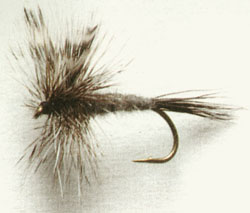|
Moose-mane Adams
Tying Instructions:
1. Start thread behind eye; tie in wings.
2. Divide wings with figure 8 thread wraps.
3. Wind to back and tie in tail.
4. Dub thread and wind to wings.
5. Tie in both hackles, tips to the rear, shiny side up.
6. Wind two turns in back and in front of wings with each.
7. Whip finish and cement head.
Tying Tip:
Tying in the wings first lets you
get them right where they belong. When you tie them
in have them pointed out over the front of the hook.
Then tilt them up and wrap several turns in front of
them to keep them upright. A few figure 8 turns between
them will separate them. Strip off some of the barbels
from the hackles to leave a short length of 'stem' to
start the winding. When winding the hackle try to 'weave'
the second one thru the first. ~D.E.
Fishing the Fly:
It is a rather odd turn of events
that one of the most used flies gets misused most often. A
dry-fly that catches way more than it's share of trout. Rarely
has such a reliable fly been so abused by so many, so much
of the time, and still catches fish. The fly is, of course, the
Adams.
How to fish it? It's a dry, isn't it;
so, upstream! Ya, right. Since the fly is used most often by
beginners who can't cast ten feet upstream, then what? Well,
it doesn't matter a whole lot does it. It usually ends up quartering
downstream ... draggin'... half-sunk ... submerged ... gettin'
hauled back ... and catching trout. Sure you should dress it
with floating stuff. You should false-cast it fast enough to dry
it off. A nice gentle presentation would help. Control of the
floating line (mending) could be a plus too.
If you are going to fish it down-stream
use a tippet the appropriate size for the hook. If, however, you
can cast it upstream, break off the barb and use one size smaller
tippet. You can do this because it takes less force to hook a trout
on a barbless fly. The lighter tippet gives the fly a more natural
drift and presentation. This increases takes, and hooks the trout
in the corner mouth, not the front teeth. Not just a few good
reasons to fish it upstream, huh?
So, for the wrap-up. Upstream and
dry, barbless, well dressed, light tippet, and a nice presentation.
Treat it with respect, the Adams is a classic.~ - JC
|



